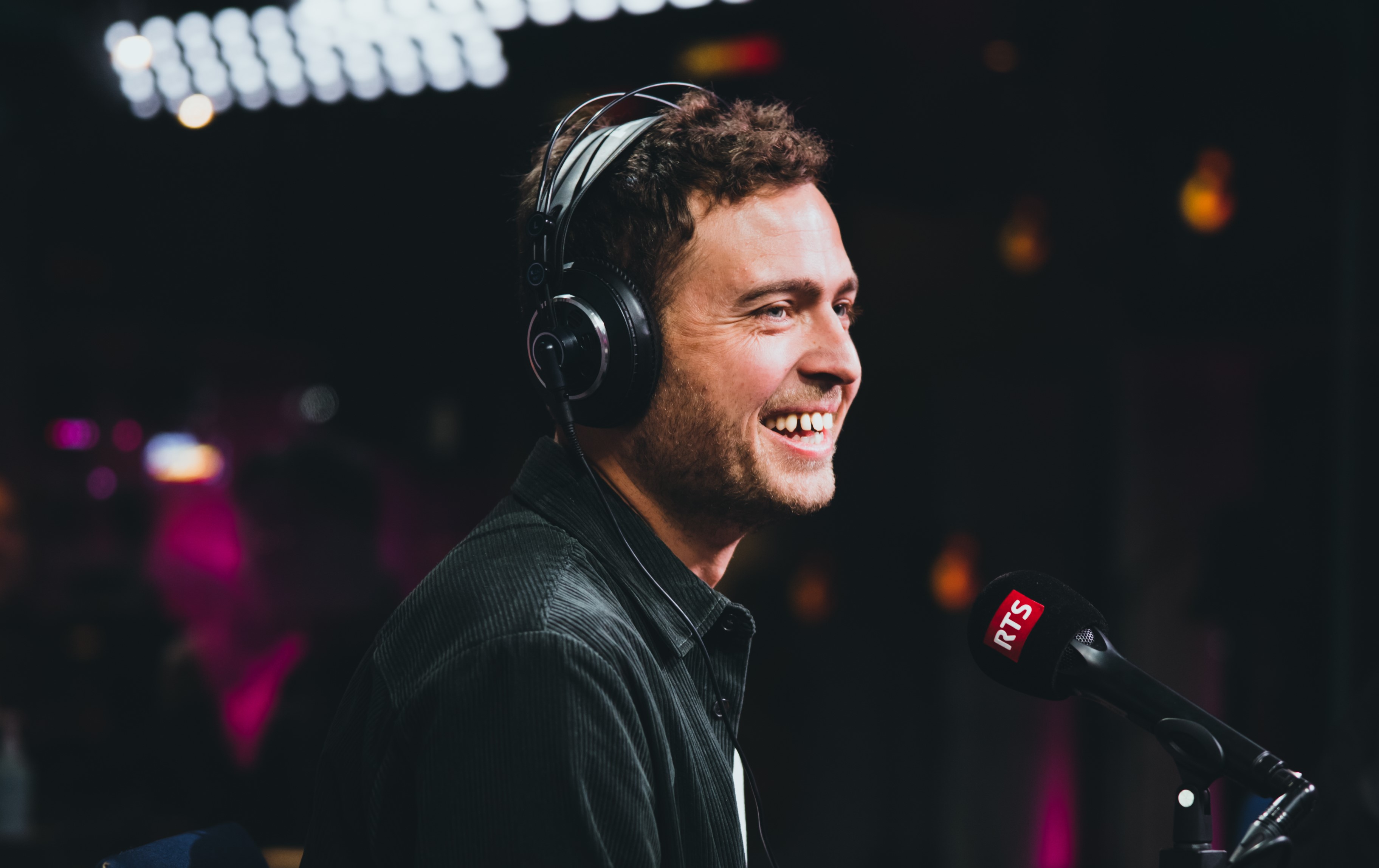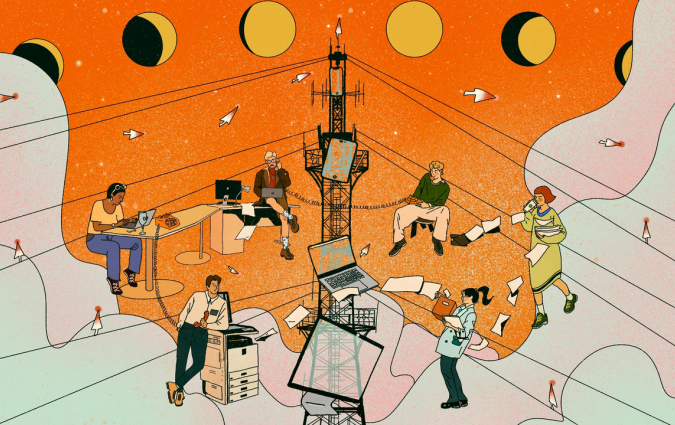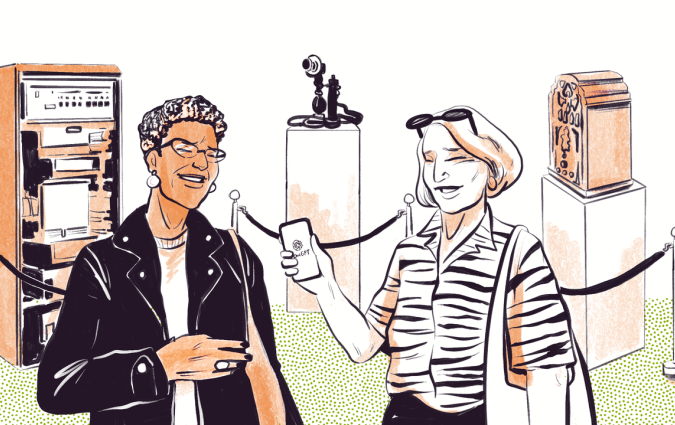The day AI clones took over a Swiss radio station

Couleur 3’s chief, Antoine Multone.
This article is part of a five-part series on AI and the future of audio. The entire series, which includes pieces and short podcast episodes, can be found at this link.
On April 27 2023, artificial intelligence completely took over a radio station in francophone Switzerland. The voices were AI clones of their real hosts, everything they said were scripts generated by AI, and even the music played was aggregated and composed by AI.
From 6 am to 7 pm that day, AI controlled the airwaves of Couleur 3, a station falling under the umbrella of public broadcaster Radio Télévision Suisse. So, how successful was the experiment? As part of our podcast series on audio and AI, I spoke with the station’s head, Antoine Multone. Our conversation was edited for clarity and length.
Listen to our 10-minute podcast episode
Q. Can you give me a flavour of what 27 April 2023 sounded like at Couleur 3?
A. It was a normal day at Couleur 3. We had all the same shows and the same people speaking. The only thing that was a bit strange was that the people speaking were not speaking exactly the same way. It was a bit different from the radio you heard on the day before. You knew there was something strange, but the voices were the same, the content was the same. We didn't say a lot at that time.
On that day, we waited a bit to see how the audience reacted and then we announced it at noon. We said, ‘OK, we are doing an experiment. Every voice was cloned and every text was generated by AI.’
Some in our audience said: ‘That was strange’, ‘Bring the humans back.’ But many also said: ‘It’s really impressive what you can do now.’ So we went on for the whole day talking with our community and experimenting with AI radio. The voices were clones and sometimes the music as well was partially generated by AI. We had three steps: the cloned [voices], the text generated by AI, and the music.
Q. Was the whole project overseen by humans?
A. We worked a lot on that project for three months. We doveted the first two months to understanding these technologies, to using them, and to trying them. Over the last month we made sure everything would be working. So we had to generate and generate again; we had to learn the AI [systems]; we had to learn how to clone the voices.
Then, we had to teach the AI the tone of our radio: for example, when people speak, how long they speak? We did a lot of work constructing the whole program. We are a radio station based on music and comedy. So cloned presenters also had to do comedy. They had to know some things about music. Most of all, we were really scared that they would put fake news on air. So we had nothing that was played on air that wasn't read by humans before.
Q. Do you think AI did a good job capturing the voice and the vibe of Couleur 3?
A. The cloned voices were amazing. That was the most impressive part. We worked with an American-Ukrainian company that usually works for Hollywood movies and they did an amazing job cloning the voices. The texts were good, but not funny. The comedy wasn't funny. For the creative part, humans are better for now. So we still have the opportunity to beat the machine, at least for now.
Q. Did you have to put on a lot of disclaimers to make sure people knew they were listening to AI-generated content?
A. Of course. Why did we do this whole thing? We did it to create a discussion. It started with a discussion in our own newsroom. With AI coming, will we lose our jobs to AI? Will we be beaten by AI in creating music, creating comedy and everything that we do?
We are not a news radio, so we wouldn't invite a lot of experts to discuss a topic. We are a creative radio station so let's try to see what the machine can and cannot do. That's why we tried it. We wanted to have this as the starting point of discussion with our audience to understand how it feels like to listen to radio that is made by a computer.
It was really great because it brought a lot of discussion and energy to our team because the audience said, ‘What I'm looking for in my radio is a companion. It’s a human. A human that makes me laugh and music that makes me happy.’ We were so happy to have that as the main feedback from the audience because our only job is to bring company to people.
Q. I guess the takeover by AI is not yet upon us, since people still want to listen to a human when they're listening to the radio.
A. It depends on the type of radio that you're doing. But I think for most of the radio, you can use AI for a lot of tasks, but not for being on air. A human can still feel if he or she is listening to a human or not, at least for now. I'm quite sure that we should be optimising the whole process of making radio with the help of technology, but the final point should be a human speaking into a microphone.
Q. You did mention how the audience reacted to this project. But I was also wondering, how did your team react when you brought this project to the forefront? Were they open to implementing all this for the day?
A. We spoke a lot about it because I was afraid that people would be really scared, but I would say half of them were really curious about it and happy to try. The other half was a bit scared. After the test, everybody was happy and proud that we tried. They understood we didn't make it to create a new, low-cost radio. We created it to be part of the debate, to be part of the discussion, and to do it our way.
Q. It's been over a year since that experiment took place. How has the station embraced or not embraced AI in this past year?
A. In the last year, we’ve worked a lot on this topic. We created guidelines on how we will and how we will not use AI in our radio and in our group because we are part of the Swiss Public Broadcasting Corporation.
We now use AI for a lot of tasks. It helps us with live transcription and with tagging content. We want to use it to distribute our content in a better way.
For example, if you only like content about politics and hip hop, I would love to create a feed that brings you everything we do exactly the way you want. That’s still a project we are not ready for, but we are working on that. For any of these tasks, a human will check everything that was made by an AI, so we never leave AI by itself. We use it to go faster and we use it to do things that we don't have time to do.
Q. Looking back at the experiment and the past year, will you say that the goals of what you were trying to achieve by doing this were successful?
A. It opened the discussion and that's the main point. When the smartphone came out, everybody was scared because we would be connected all the time and it would be awful. Now everybody has it.
AI is the new thing and we have to know how to use it. We have to still be interested, still try to understand the possibilities, and try to innovate with these technologies and keep the trust with our audience. That's the main thing. When we use AI, we say it. When we use AI for any task that the audience can listen to, we have to say it was made with the help of AI. It can help us to do better radio, better media, but we have this contract with our audience and we have to respect that.
In every email we send you'll find original reporting, evidence-based insights, online seminars and readings curated from 100s of sources - all in 5 minutes.
- Twice a week
- More than 20,000 people receive it
- Unsubscribe any time
signup block
In every email we send you'll find original reporting, evidence-based insights, online seminars and readings curated from 100s of sources - all in 5 minutes.
- Twice a week
- More than 20,000 people receive it
- Unsubscribe any time






